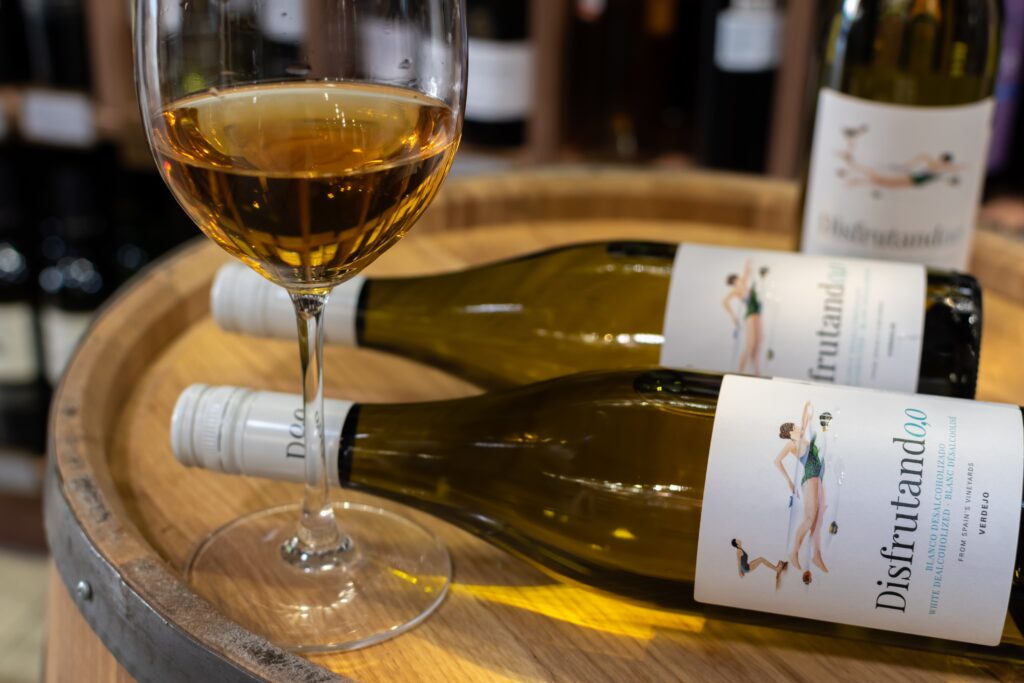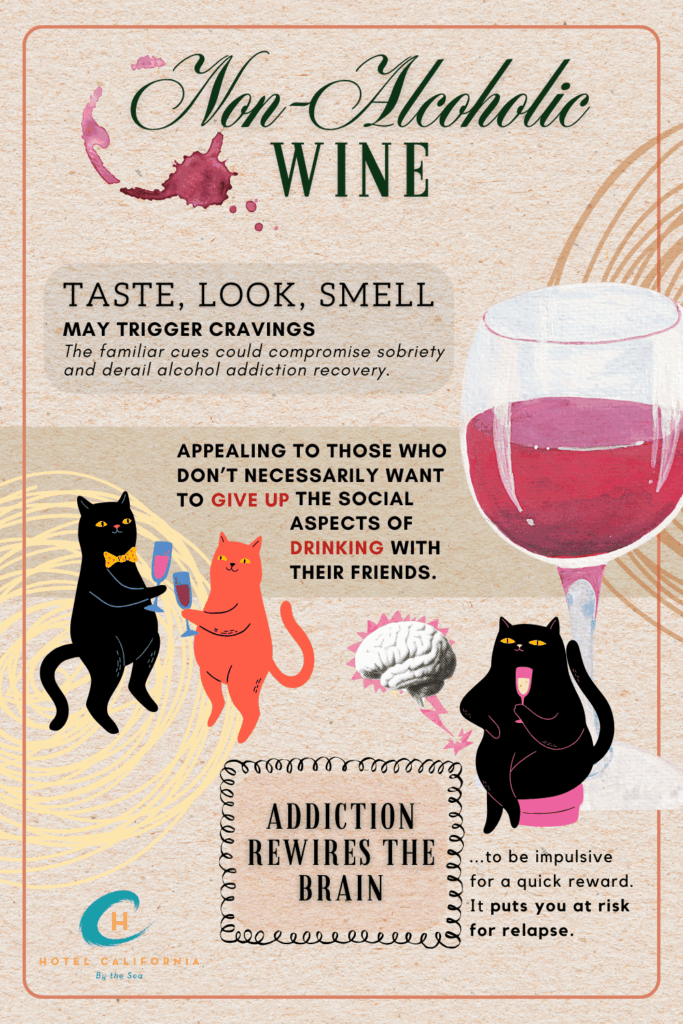Trends: Non Alcoholic Wine
There is a growing trend of non alcoholic beverages, including non alcoholic wine, non alcoholic beer and non alcoholic cocktails, or mocktails. There are many factors pushing this new trend including the popularity of positive mental health and physical wellness. Advocates for the consumption of non alcoholic beverages claim it is better for the general health of society. However, the lines become blurred when it comes to sobriety and alcohol addiction.

On one hand, non alcoholic beverages can be appealing to those who don’t necessarily want to give up the social aspects of drinking with their friends. It can give them an alternative to stay in touch without compromising their overall health. It can help reduce the risk of liver disease, sleep disorders, mental health disorders such as anxiety and depression, GI issues and other cognitive health issues.
On the other hand, the look, taste and smell of some of these non alcoholic beverages could set off potential triggers to those who are in active addiction or recovery. These cues, which sometimes include the same branding as traditional alcoholic beverages, can trigger cravings for alcohol and lead users to chase the real deal. Ultimately, compromising their sobriety and alcohol recovery.
Alcohol Use Disorder
According to the National Institute on Alcohol Abuse and Alcoholism, an estimated 90% of recovering alcoholics experience at least one relapse in the four years after alcohol cessation. Alcohol addiction is a chronic relapsing disorder. Relapsing is part of recovery and it is a normal process. However, sometimes products such as non alcoholic wine or non alcoholic beer can make it more tricky to stay sober and avoid relapse.
Addiction rewires the brain. It rewires the brain to favor impulsive and quick rewards. Drinking alcohol is one of them. In some cases, when drinking even non alcoholic beverages, it can trick the brain into thinking you are engaging in old drinking habits and will produce urges and cravings for alcohol. This puts you at risk for relapse.

How Non Alcoholic Wine and beverages impact Alcohol Recovery
In a study published by Alcoholism: Clinical & Experimental, researchers found that drinking alcohol releases dopamine chemicals in the brain. Dopamine produces feelings of pleasure. There is a level of expectancy in which the person seeking a buzz will begin to anticipate. When it comes to non alcoholic wine and beverages, the act of drinking is often associated with the psychological feelings of the dopamine rush and buzz. Even when there is no alcohol, your mind and body can develop the same reaction as if there were alcohol.
Non alcoholic drinks can be a very slippery slope for those who are in alcohol addiction recovery. Non alcoholic drinks can stir up feelings for the real deal. Certain smells, tastes and environments associated with alcohol use can cause triggers. These triggers then lead to real cravings. When you give in to your cravings, you can fall into relapse. Oftentimes, the non alcoholic versions taste and look like the real thing, which can psychologically be dangerous for a person who misses the act of drinking.
Non-profit organization Stout Street Foundation is a recovery organization that believes even non alcoholic tasting beer can trigger a euphoric recall of their alcohol addiction. It can stir up positive memories of their addiction with difficulty recalling the negative aspects of alcohol abuse.
What is considered Non Alcoholic?
Alcohol is a byproduct of the fermentation process. This means even with drinks that are not considered alcoholic, they may contain very little traces of alcohol due to how the drink is processed and manufactured. Though they are not considered to be alcoholic drinks, the following are beverages that may contain very small traces of alcohol due to the fermentation process.
- Kombucha – a beverage made by adding sugar, yeast and bacteria to tea
- Kefir – a fermented milk drink similar to that of yogurt
- Kvass – this is a fermented beverage made from rye bread and is popular in Eastern Europe and Russia
- Tepache – this is a popular fermented beverage from Mexico made from pineapple rinds, sugar and water
- Vinegars – all vinegars, including balsamic and apple cider vinegar,r have to go through a fermentation process, which can leave behind small traces of alcohol
According to the US Alcohol and Tobacco Tax and Trade Bureau, beverages labeled as non alcoholic must contain less than 0.5% alcohol by volume. This threshold for the amount of alcohol a beverage can contain allows for the production and consumption of beverages that undergo fermentation. This is the general standard in the US.
Beverages labeled alcohol free contain no traces of alcohol. It is something everyone can consume. For those looking to avoid alcohol completely, these are the beverages to look for. Some alcohol free drinks include sparkling water or fruit-infused seltzers, mocktails, herbal tea, soda and cola.
Low alcohol beverages are, by definition, a low alcoholic content drink that contains less than 0.5% alcohol by volume. This can be an ideal choice for moderate drinkers who do not have health concerns to worry about. The odds of becoming intoxicated through low alcoholic drinks are very, very low. Beverages in this category include non alcoholic wine.
Check Your Insurance Coverage for FREE
Find out if your insurance covers addiction treatment in minutes. We accept most insurance!
Non Alcoholic Wine
Non alcoholic drinks are now more readily and easily available. Now, many restaurants offer a non alcoholic beverage section of their menu dedicated to beers, wines and cocktails that do not contain alcohol. The sales of alcohol alternatives like non alcoholic wine are growing by about 20% each year.
Non alcoholic wine can have the same aroma, smell, taste and texture as regular wine. In fact, it can also contain the benefits of antioxidants that help prevent heart disease. Because of this, more and more people are turning to this alternative. It helps them remain social and enjoy the cultural aspects of drinking with others while avoiding the harmful effects of alcohol. It can help those who are trying to transition away from alcohol use and ultimately prevent alcohol addiction.
According to International Wine and Spirit Research’s Drink Market Analysis, non alcoholic beverage consumption is expected to increase by a third by 2026. Consumers are now reaching for the non alcoholic alternative more often.
A 2023 survey from Casinos.us found that 67% of Americans are actively reducing their alcohol consumption. This has led to the opening of sober bars across the country. New York City has the largest number of sober bars with 23 locations at the time of the survey. Mesa, Arizona has 21 sober bars and other cities with at least more than 10 sober bars include Denver, Colorado, San Francisco, California and Oakland, California.
What to consider before drinking Non Alcoholic Wine or beverages if you are in Alcohol Recovery
- Triggers – Record your triggers. It can be things, places, or people that make you want to drink.
- Avoid risky situations – Stay away from potential places where people may drink socially so it will not tempt you to drink.
- Plan ahead – Have a plan set for when external triggers occur and practice your response. Leave a situation if it tempts you to drink.
- Open up – Be open to talking about your problems with your support system. It can make you feel less alone knowing there are others who understand and are willing to help when they can.
Reach out to Hotel California by the Sea
We specialize in treating addiction and other co-occurring disorders, such as PTSD. Our Admissions specialists are available to walk you through the best options for treating your addiction.
Treatment for Alcohol Use Disorder
Non alcoholic wine and beverages can be a healthier alternative for those looking to reduce alcohol consumption, maintain a healthy lifestyle, all without compromising on the social aspects of drinking. However, for those in alcohol recovery, engaging with non alcoholic beverages can be risky. The psychological impact of drinking so similar to alcohol can be triggering and send the person back into their old, dangerous drinking habits. Professional behavioral health programs such as Hotel California by the Sea provide comprehensive treatment for those with alcohol use disorder.
We offer treatment at all levels of care including detox, residential, PHP and IOP. We offer evidence-based methods such CBT, DBT and EMDR therapy. Hotel California by the Sea is dedicated to helping clients achieve their goals in recovery and overcome their alcohol addiction.
References:
https://med.stanford.edu/news/insights/2024/02/non-alcoholic-drinks-and-alcoholism.html
https://www.drugrehab.com/addiction/alcohol/nonalcoholic-drinks
https://www.techexplorist.com/considering-non-alcoholic-drinks-alcohol-problems/81582
https://bradfordhealth.com/can-you-drink-mocktails-in-recovery
https://iamsober.com/en/blog/non-alcoholic-beer
https://www.forbes.com/sites/jesscording/2024/04/29/how-bars-are-responding-to-demand-for-better-non-alcoholic-beverages
https://www.rehab-recovery.co.uk/addiction-guides/can-alcoholic-safely-drink-non-alcoholic-drinks-mocktails/
